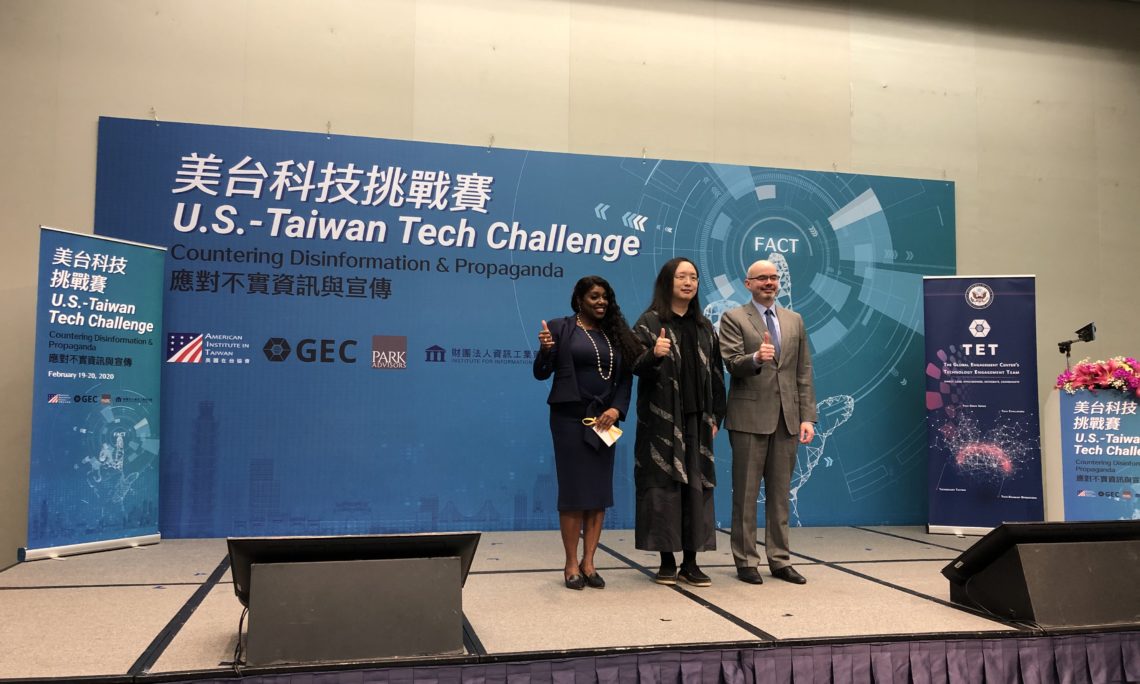OT-2002
February 19, 2020
Remarks by AIT Deputy Director Raymond Greene at U.S.-Taiwan Tech Challenge Day 1
February 19, 2020
(As Prepared for Delivery)
Digital Minister Audrey Tang, Director Patricia Watts, distinguished guests and friends, good morning. On behalf of the American Institute in Taiwan, it is my honor and distinct pleasure to welcome everyone to day one of the U.S.-Taiwan Tech Challenge: Countering Disinformation and Propaganda.
I would like to thank our State Department colleagues from the Global Engagement Center, our partners from Park Advisors in the United States and the Institute for Information Industry here in Taiwan, for their collaboration in organizing and hosting this event. I would also like to thank the representatives of the seven companies that have come to compete in today’s Tech Challenge. A special welcome to the teams that have traveled here from Israel and Australia – and for all of you for taking the time to be a part of this important endeavor.
Today’s event brings together technologists who are developing innovative solutions to the problem of hostile propaganda and disinformation. The participating companies will be demonstrating their solutions to a panel of government officials and local partners who tomorrow afternoon will announce grant money totaling $250,000 to a team or teams whose technology is deemed to have the greatest potential to solve regional challenges. This two-day event is an interdisciplinary approach to convening regional technologists, major tech companies, non-governmental organizations, and the media. We hope to build shared awareness of this critical problem, to deploy cutting-edge technology to combat propaganda and disinformation, and to build future resiliency within our communities.
Countering propaganda and disinformation is one of the most vexing and complex challenges facing democratic societies around the world today. Our adversaries use propaganda and disinformation to sow confusion over basic facts; this disinformation can tear at the fabric of a functioning democratic society and create manipulative narratives that are an affront to our democratic values. Malign actors believe that if they can make our societies more polarized and less able to distinguish fact from fiction, then people will begin to lose faith in democratic institutions. Both Taiwan and the United States are confronted by these threats.
As the United States confronts this challenge, we begin with the premise that innovative solutions to the most pressing problems often don’t come from government, but instead from different corners of our society. For this reason, we are working diligently to share information with the public, private industry, civil society, and academic groups. And while we work on stopping the spread of disinformation, we also encourage Americans to consume media critically, considering the origin of their information and motivation of the source.
As I work with my colleagues in Washington on these issues, I frequently praise Taiwan’s approach to this challenge. Taiwan is on the frontline of the disinformation battlefield and faces attacks from a very determined opponent. China has invested heavily to develop ever-more sophisticated ways to anonymously disseminate disinformation through a number of channels, including social media. As their malign methods evolve, the motivation remains the same: to weaken Taiwan’s hard-won democracy and freedom. A comprehensive assault requires a comprehensive response, which is what we have seen from Taiwan. I believe the United States has much to learn from Taiwan’s whole-of-society approach, which combines school curriculum reform, tech development, academic research, refined fact-checking methods, and much more.
The United States and Taiwan are capable and complementary partners in confronting the challenge of disinformation. One of the ways we like to characterize the U.S.-Taiwan relationship is Strive Together, Thrive Together or 「共同努力,共同得益」. We are working together to share our experiences and expertise with other countries in the Indo-Pacific and around the world. To that end, over the past two years, we have held two media literacy workshops under the Global Cooperation and Training Framework, and a TechCamp for hacktivists, social media influencers, and journalists from around the region, all focused on disarming disinformation and cultivating media literacy.
The challenge of disinformation, however, is something no one society or government can do alone. It is members of civil society – the tech community, NGOs, academics, and journalists – that are the key players in finding innovative solutions to reduce the reach of disinformation. We are confident that the assembled technologists, experts, and others at this Tech Challenge will be able to develop cutting-edge solutions to the challenges posed by disinformation.
I look forward to hearing more about the innovative ideas that come out of the next two days.
Thank you.
















![Video Thumbnail [Recovered]-01](../wp-content/uploads/sites/269/Video-Thumbnail-Recovered-01-1-750x450.jpg)






